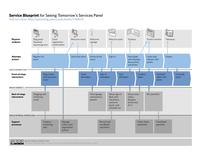
Photo from wikipedia
This paper investigates whether the setting of loss reserves depends on an insurer’s complexity, which is defined by the number of business lines an insurer underwrites and on the insurer’s… Click to show full abstract
This paper investigates whether the setting of loss reserves depends on an insurer’s complexity, which is defined by the number of business lines an insurer underwrites and on the insurer’s expertise in those lines. Our results suggest that insurers with higher levels of complexity tend to over-reserve. We also find that, as complexity increases, insurers that are financially weak and smooth their earnings, tend to under-reserve (i.e., bias their loss reserves upward). Further, we find that as complexity increases, insurers with high tax liabilities tend to bias their loss reserves downward (i.e., over-reserve), suggesting that tax strategies are important issues for insurers. An insurer’s degree of complexity is particularly salient when determining the extent to which loss reserves can be aggressively set.
Journal Title: Quarterly Journal of Finance
Year Published: 2019
Link to full text (if available)
Share on Social Media: Sign Up to like & get
recommendations!